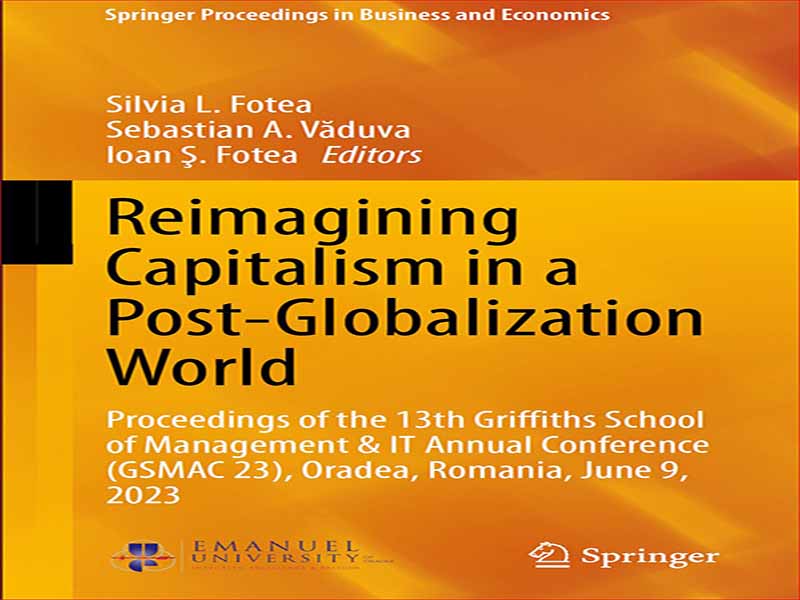- عنوان کتاب: Reimagining Capitalism in a Post-Globalization World
- نویسنده: Silvia L. Fotea
- حوزه: سرمایه داری
- سال انتشار: 2023
- تعداد صفحه: 496
- زبان اصلی: انگلیسی
- نوع فایل: pdf
- حجم فایل: 21.1 مگابایت
رویکردهای مدیریتی مختلف به سرمایه داری ذینفعان به دلیل پویایی جهانی که در آن زندگی می کنیم و اختلافات اقتصادی بین افراد، موضوع مهمی را نشان می دهد. کل اقتصاد مبتنی بر میلیاردها شبکه است که به طور مداوم تحت حمایت جهانی شدن و تنوع بازارها به هم متصل می شوند، رقابت پذیری افزایش یافته برای کسب سود، و سرمایه داری در این زمینه نقش کلیدی ایفا می کند. محیط کسب و کار دیگر نه تنها برای منافع سهامداران خود و به حداکثر رساندن سودآوری ارزش قائل می شود، بلکه به همه سهامدارانی که در موفقیت بلندمدت سازمان سهیم هستند، اعتبار بیشتری می دهد. آنها می توانند قسمت نادیده کوه یخ / سطح عمق مدل کسب و کار را نشان دهند. متخصصان مدیریت مانند اریک رنمن، راسل آکولف و ایگور آنسوف به گسترش مفهوم سهامداران در دهه 1960 کمک کردند (Freeman & Liedtka، ). برای فریمن و لیدکا ()، سازمان ها جدا از بقیه جامعه در نظر گرفته نمی شوند، اما آنها بخشی فعال از آن هستند. از لحاظ تاریخی، مفهوم مدیریت ذینفعان در دهه 1980 شکل گرفت و ابزاری برای تجزیه و تحلیل منافع کسانی در نظر گرفته شد که تأثیر خاصی بر سازمان ها اعمال می کردند و همچنین تحت تأثیر آنها قرار می گرفتند (Freeman & Liedtka, ) – این نشان دهنده شرطی شدن دوگانه است. دو متغیر سازمانها دو مسیر عمل دارند که به آنها امکان میدهد یا بر نیازهای سهامداران یا نیازهای سهامداران تمرکز کنند، اما انتخاب تنها یک گزینه یک انتخاب ناقص است (Freeman & Liedtka، ). علاوه بر این، بیشتر اوقات، منافع دو دسته (سهامداران و ذینفعان) تلاقی می کنند و در بسیاری از موقعیت ها با هم رقابت نمی کنند (Freeman & Liedtka, ). قرن بیستم با سه رویکرد ایدئولوژیک مشخص شد: سوسیالیسم، کمونیسم، و سرمایه داری (هاجسون، ). سرمایه داری یک سیستم تطبیق زا بوده و هست – فوجیاما () در باسیری و جونز () نشانگر «پایان تاریخ» است که با برتری سرمایه داری بر سوسیالیسم توتالیتر آغاز شد، لحظه ای که با پایان جنگ سرد مصادف شد. این نیز یک سیستم مناقشه است – ادراکات نظریه پردازان جامعه شناسی و متخصصان اقتصادی درگیر در ایدئولوژی های متمایز بر ویژگی اخلاقی سیستم در نوسان است (بسیری و جونز، ). از دیدگاه ذینفعان (فریمن و لیدکا، ) سرمایه داری «باید الگویی برای فرآیندهایی باشد که شرکت ها را به بهترین شرکت ها تبدیل می کند».
The various management approaches to stakeholder capitalism represent an impor¬tant topic due to the dynamism of the world in which we live and the economic discrepancies between individuals. The entire economy is one based on billions of networks that are constantly interconnecting under the auspices of globalization and diversity of markets, increased competitiveness for profit, and capitalism plays a key role in this regard. The business environment begins to value no longer only the interests of its shareholders and maximizing profitability but is giving more credit to all stakeholders who contribute to the organization’s long-term success. They can represent the unseen part of an iceberg/the level of depth of the business model.
Management specialists such as Eric Rhenman, Russell Ackolf and Igor Ansoff helped expand the concept of stakeholders in the 1960s (Freeman & Liedtka, ). For Freeman and Liedtka (), organizations are not considered isolated from the rest of society, but they are an active part of it. Historically, the notion of stakeholder management took shape in the 1980s and was considered a tool for analysing the interests of those who exerted a certain influence on organizations and were also affected by them (Freeman & Liedtka, )—this shows the double conditioning of the two variables.
Organizations have two courses of action that allow them to focus either on the needs of stakeholders or on the needs of shareholders, but choosing only one option is a flawed choice (Freeman & Liedtka, ). Moreover, most of the time, the interests of the two categories (shareholders and stakeholders) intersect, and in many situations, they are not competing (Freeman & Liedtka, ). The twentieth century was marked by three ideological approaches: socialism, communism, and capitalism (Hodgson, ). Capitalism was and is an adaptogenic system—Fujiyama () in Bassiry and Jones () marks the “end of history” triggered by the supremacy of capitalism over totalitarian socialism, a moment that coincided with the end of the Cold War. It is also a system of controversy—the perceptions of sociological theorists and economic specialists engaged in distinct ideologies have oscillated on the moral character of the system (Bassiry & Jones, ). From the perspective of stakeholders (Freeman & Liedtka, ) capitalism “should serve as a model for the processes that make companies the best companies.”
این کتاب را بصورت رایگان از لینک زیر دانلود نمایید.
Download: Reimagining Capitalism in a Post-Globalization World



































نظرات کاربران